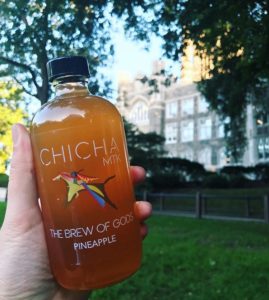By Aislinn Keely

Sergio Miranda, FCRH ’18, cares about the bacteria in our bodies so much so that he travels to Bushwick every weekend to sell his gut-healing drink, Chicha. He spent the last two summers building a business model around the probiotic-packed drink, one of cultural significance in his native Colombia.
Chicha is a corn-based drink from South American countries, according to Miranda. Originally consumed by the Inca, it was used as a celebratory beverage due to its alcohol content. Chicha is packed with health benefits, including probiotics and antioxidants, and even the alcohol content can contribute to the oxygenation of the blood, according to Miranda.
Miranda now lives in Montauk, although he spent his childhood in Colombia. He and friends from Montauk discussed the “functional beverage market,” which includes drinks like kombucha. This reminded him of the probiotic-filled drink from his years in Colombia. “I grew up around Chicha in Colombia… I had it a couple times in my childhood,” he said.
The topic of Chicha came up again when he encountered a promoter who found the concept interesting. She offered to stock Miranda’s Chicha, which he had yet to brew.
Neither Miranda nor his father knew how to brew the drink initially. “It’s actually thanks to my grandparents that I have the recipe, although it’s pretty public,” said Miranda.
He used their recipe to brew enough Chicha for the promoter’s party. “I got a really positive reaction. From there, I just thought it was not a bad idea,” he said.
He poured his savings from his ocean lifeguarding job into the idea, getting basic advice from the Fordham Foundry before applying to Foodworks, an incubator for food-based companies. “This summer, I decided to put all the energy into it,” he said.
In the kitchen of the Foodworks incubator, Chicha and its gut healing bacteria grew. Miranda makes batches of the drink at the Foodworks space. “It’s pretty simple and it’s similar to the way kombucha is made,” he said.
To make the beverage, Miranda ferments corn in a clay pot with sugar and leaves it in a warm closet between two and three weeks. The bacteria eats the sugar, creating the probiotics of the drink as well as a low alcohol content. “It’s a long process,” said Miranda.
Because the alcohol content is below five percent, Miranda is not subject to stipulations regarding alcohol products. “Although Chicha is consumed for alcoholic purposes in South American countries like Colombia, I’m not trying to promote that level,” he said.
However, he said that he would not encourage children to buy the drink.
Once the drink ferments, Miranda adds fruit to make two of the three flavors: pineapple and berry. The third flavor is original, which is flavored by the corn and sugar. The microorganisms eat the flesh of the fruit, preserving the flavor in the Chicha, according to Miranda.
Miranda then filters the concoction and bottles it, before leaving it to carbonate itself through further fermentation.
As for ingredient sourcing, Miranda buys his corn near Bushwick from a market owned by a Mexican family in lieu of a traditional supermarket. The quality of their produce is high for a low price, according to Miranda. “If it wasn’t for them, I’d have to buy from the grocery store. I know that the quality of their produce is better,” he said.
He obtains his fruit from other entrepreneurs at Foodworks. “At FoodWorks it’s kind of like a community where there are a lot of food entrepreneurs and we help each other,” said Miranda.
Through this sourcing of ingredients, Miranda is able to keep his overhead costs low. However, Chicha is primarily concerned with quality, according to Miranda.
He said that having a recyclable glass bottle is important to him, despite not having any cost benefit. “It’s imperative for me to have a glass bottle and provide people with a high quality product,” said Miranda.
Foodworks assisted Miranda in getting the necessary permits to sell a consumable product. “It was easier for me to develop all the insurance and certificates and all that stuff because they already provide that information for you, which before that, I thought it was almost impossible,” he said.
Miranda said he wants to stay with the company as long as possible, and is currently only using capital from his savings and his family. “I’m trying to stay away from investors, although I’m open to them. I’m not in a rush,” he said.
Miranda said he hopes that his company will educate people on the importance of probiotics, as well as the cultural significance of the drink. “I’m trying to sell probiotics, that’s what I’m trying to educate people about,” he said, “I want to bring consciousness to people about a cultural drink. It’s part of the Americas.”
Emily Leaman, GSB ’20, assists Miranda in his marketing efforts. Leaman is involved with the Social Innovation Collaboratory. She said she sees the value in Miranda’s work. “I see the product being appreciated in particular by health and eco-conscious consumers as Chicha has an array of health benefits as well as a commitment to sustainability,” she said.
Leaman said the company is a way to educate people on healthy choices and South American culture. “I see Chicha cultivating a newfound curiosity and appreciation for South American culture as part of our purpose is to invite others to experience and learn about its tradition. Furthermore, we want to provide consumers with a healthy alternative to the sugar-intense beverages that are currently on the market,” she said.
Miranda is currently working on the 20-C form from the Department of Agriculture, which will allow him to sell his product in retail stores. This would be an addition to his weekly journey to sell at Bushwick Farmers Market. Miranda has already been in contact with retail stores in Brooklyn and Montauk about the sale of his product.






































































































































































































